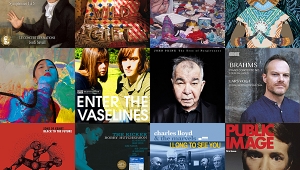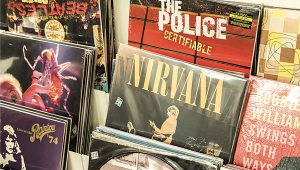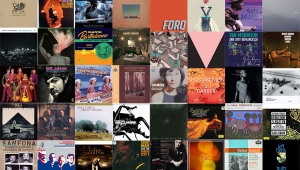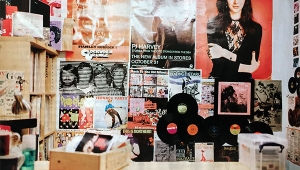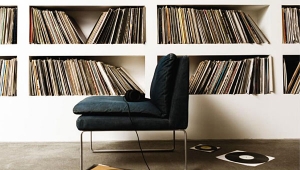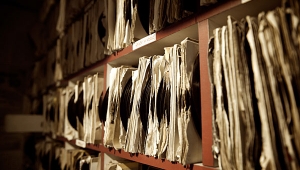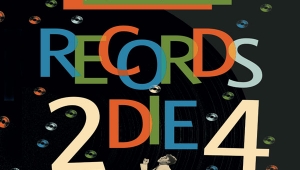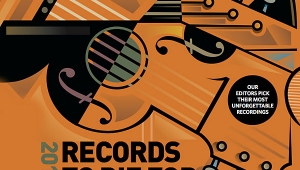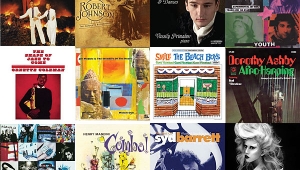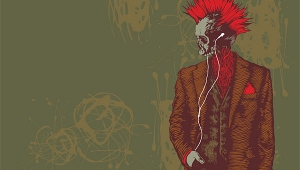| Columns Retired Columns & Blogs |
2000 Records to Die For Page 12
David Vernier
BENJAMIN BRITTEN: Britten the Performer
Fauré: La Bonne Chanson, Op.61. Purcell: Five Songs (realized by B. Britten). Schubert: Three Songs. Schumann: Liederkreis, Op.39.
Peter Pears, tenor; Benjamin Britten, piano
BBC Music BBCB 8006-2 (mono CD). 1958-59/1999. Ivor Walsworth, prod.; Derek Horsman, remastering eng. ADD. TT: 74:58
We are very fortunate to have such priceless musical treasures as this document, recorded live, of one of this century's most fruitful and mutually inspiring artistic partnerships. That something very special is going on in these performances is unquestionable; that the performers happen to be this century's greatest composer and one of its more atypical tenor voices only adds to the mystique of their enduring collaboration. The music is wonderful, and Pears is at the absolute top of his form—especially evident in the four English folksong arrangements by Britten, where Pears' rapport with his late-1950s Aldeburgh audience reaches across 40 years to rope in anyone within earshot of your speakers. And Britten knows every cue, every nuance of phrasing that makes for perfect communication and a perfect concert. Does this sound too close to artist worship? What can I say? Timeless, transcendent music-making speaks for itself.
TYE: Three Masses: "Euge Bone," "Peterhouse," "Western Wind"
Paul Trepte, Ely Cathedral Choir
ASV 190 (2 CDs). 1999. Séan Farrell, prod.; David Wild, eng. DDD. TT: 82:37
You know those recordings that somehow seem to perfectly capture a time and place—even an era? Dylan's Freewheelin', Hendrix's Live at Winterland, The Beatles' Sgt. Pepper's (you know how old I am now). Well, here's one that convinces me that I'm hearing the sounds that Ely Cathedral choirmaster/composer Christopher Tye heard way back in the 16th century (I'm not that old). There's an aura surrounding this recording that's attributable to the sublime singing of the modern-day Ely Cathedral choir—but most of all to the ethereal music of these three masses, in which the centuries-old Latin texts are infused with an otherworldly beauty that few composers other than Byrd, Josquin, and Palestrina have accomplished. The true test of timeless, classic music is that you can listen over and over and never grow tired or bored. This music has got all the characteristics of a classic, and it's recorded in the kind of huge, eternally resonant acoustic space that lets it bloom forever. Even if you're not the religious sort, this music—and the glorious sound of this choir and space—will win you over.
TCHAIKOVSKY: The Nutcracker
Valery Gergiev, Kirov Orchestra
Philips 462 114-2 (CD). 1998. Anna Bary, prod.; Jaap de Jong, Thijs Hoekstra, engs. DDD. TT: 81:03
This is the most analog-sounding classical CD I know. It was recorded on Jaap de Jong's vacuum-tube equipment using a minimal mike setup. (For history and details, see Stereophile, September 1999, pp.25-26.) String sound is very subtle, never screechy, and you can almost touch the acoustics of the Baden-Baden Festspielhaus. There are a few better performances of The Nutcracker, all from eastern European orchestras—maybe Gergiev has been away from Russia a little too long—but the Kirov still teaches all western orchestras a respectable lesson in how to play Tchaikovsky.
ARVO PÄRT: Fratres, Cantus in Memory of Benjamin Britten
Tamás Benedek, Hungarian State Opera Orchestra
Naxos 8.553750 (CD). 1997. prod. eng. not listed. DDD. TT: 79:05
The first time I heard the Cantus in Memory of Benjamin Britten, at a concert by the Rotterdam Philharmonic, I sat nailed to my seat. I then went to a record shop, compared the available recordings, and chose this one. The Fratres, also new to me, came as a pleasant gift—very, very emotional—but what the Hungarians do with the Cantus is so moving that I can hear it only on special occasions. Sonics are acceptable—not bad, but not better than average. They don't stand in the way of the music.
JON IVERSON: Alternesia
M•A Recordings/Series Momentum M3 (CD). 1999. Jon Iverson, prod., eng. ADD. TT: 46:28
Jon Iverson, Stereophile's webmaster—or "webmonkey," as he prefers to call himself—is not merely an excellent writer and computer whiz. He's also an artist, musician, and composer whose first commercial disc deserves a spin by anyone who loves musical substance coupled with great sound. On Alternesia, JI (aided by a couple of friends) plays his own compositions on a variety of traditional Indonesian instruments. The compositions, however, are anything but traditional. Some are even "structured like pop songs," he says. Part science-fiction soundtrack, part hypermodern ballet score, and part sonic dreamscape, Alternesia was recorded in real time on a modified MCI JH100 2" 16-track analog tape machine. The disc will challenge your musical complacency and your audio system, but may be hard to find. M•A Recordings can be reached at (818) 907-9997 or at their website. (XXII-9)
FIONA APPLE: Tidal
The Work Group/Clean Slate OK 67439 (CD). 1996. Andrew Slater, prod.; Mark Endert, eng., mix; Claude Achille, Brian Scheubel, Jim Wirt, Niko Bolas, Troy Gonzalez, Al Sanderson, engs. AAD? TT: 51:44
Certain artists seem to magically absorb all that came before them, claim it as their own, and create something new, authentic, and real in the process. Fiona Apple's influences pop up here and there in her music—she thanks poet Maya Angelou in the disc's accompanying booklet—but never more than as echoes half-heard down a dark, damp street. Tidal, a collection of her own compositions, demonstrates that she has attained independence and maturity as an artist. Waif with an old soul, Apple takes her brooding emotional complexity and self-doubt into dark, subterranean territory with songs like "The Child is Gone" and "Never is a Promise." Remorse over an intentionally lost love is the core of the ironically hard-driving "Criminal," a song that got a lot of well-deserved radio play last year. It's not all pain and suffering for Ms. Apple, however. "Slow Like Honey," conveyed in her smoky, wise-beyond-her-years contralto, is as seductive a tune as you'll ever hear. Fiona Apple is living proof that a student can surpass her teachers—all of them.
BENJAMIN BRITTEN: Britten the Performer
Fauré: La Bonne Chanson, Op.61. Purcell: Five Songs (realized by B. Britten). Schubert: Three Songs. Schumann: Liederkreis, Op.39.
Peter Pears, tenor; Benjamin Britten, piano
BBC Music BBCB 8006-2 (mono CD). 1958-59/1999. Ivor Walsworth, prod.; Derek Horsman, remastering eng. ADD. TT: 74:58
We are very fortunate to have such priceless musical treasures as this document, recorded live, of one of this century's most fruitful and mutually inspiring artistic partnerships. That something very special is going on in these performances is unquestionable; that the performers happen to be this century's greatest composer and one of its more atypical tenor voices only adds to the mystique of their enduring collaboration. The music is wonderful, and Pears is at the absolute top of his form—especially evident in the four English folksong arrangements by Britten, where Pears' rapport with his late-1950s Aldeburgh audience reaches across 40 years to rope in anyone within earshot of your speakers. And Britten knows every cue, every nuance of phrasing that makes for perfect communication and a perfect concert. Does this sound too close to artist worship? What can I say? Timeless, transcendent music-making speaks for itself.
TYE: Three Masses: "Euge Bone," "Peterhouse," "Western Wind"
Paul Trepte, Ely Cathedral Choir
ASV 190 (2 CDs). 1999. Séan Farrell, prod.; David Wild, eng. DDD. TT: 82:37
You know those recordings that somehow seem to perfectly capture a time and place—even an era? Dylan's Freewheelin', Hendrix's Live at Winterland, The Beatles' Sgt. Pepper's (you know how old I am now). Well, here's one that convinces me that I'm hearing the sounds that Ely Cathedral choirmaster/composer Christopher Tye heard way back in the 16th century (I'm not that old). There's an aura surrounding this recording that's attributable to the sublime singing of the modern-day Ely Cathedral choir—but most of all to the ethereal music of these three masses, in which the centuries-old Latin texts are infused with an otherworldly beauty that few composers other than Byrd, Josquin, and Palestrina have accomplished. The true test of timeless, classic music is that you can listen over and over and never grow tired or bored. This music has got all the characteristics of a classic, and it's recorded in the kind of huge, eternally resonant acoustic space that lets it bloom forever. Even if you're not the religious sort, this music—and the glorious sound of this choir and space—will win you over.
![]()
Peter van Willenswaard
TCHAIKOVSKY: The Nutcracker
Valery Gergiev, Kirov Orchestra
Philips 462 114-2 (CD). 1998. Anna Bary, prod.; Jaap de Jong, Thijs Hoekstra, engs. DDD. TT: 81:03
This is the most analog-sounding classical CD I know. It was recorded on Jaap de Jong's vacuum-tube equipment using a minimal mike setup. (For history and details, see Stereophile, September 1999, pp.25-26.) String sound is very subtle, never screechy, and you can almost touch the acoustics of the Baden-Baden Festspielhaus. There are a few better performances of The Nutcracker, all from eastern European orchestras—maybe Gergiev has been away from Russia a little too long—but the Kirov still teaches all western orchestras a respectable lesson in how to play Tchaikovsky.
ARVO PÄRT: Fratres, Cantus in Memory of Benjamin Britten
Tamás Benedek, Hungarian State Opera Orchestra
Naxos 8.553750 (CD). 1997. prod. eng. not listed. DDD. TT: 79:05
The first time I heard the Cantus in Memory of Benjamin Britten, at a concert by the Rotterdam Philharmonic, I sat nailed to my seat. I then went to a record shop, compared the available recordings, and chose this one. The Fratres, also new to me, came as a pleasant gift—very, very emotional—but what the Hungarians do with the Cantus is so moving that I can hear it only on special occasions. Sonics are acceptable—not bad, but not better than average. They don't stand in the way of the music.
![]()
Barry Willis
JON IVERSON: Alternesia
M•A Recordings/Series Momentum M3 (CD). 1999. Jon Iverson, prod., eng. ADD. TT: 46:28
Jon Iverson, Stereophile's webmaster—or "webmonkey," as he prefers to call himself—is not merely an excellent writer and computer whiz. He's also an artist, musician, and composer whose first commercial disc deserves a spin by anyone who loves musical substance coupled with great sound. On Alternesia, JI (aided by a couple of friends) plays his own compositions on a variety of traditional Indonesian instruments. The compositions, however, are anything but traditional. Some are even "structured like pop songs," he says. Part science-fiction soundtrack, part hypermodern ballet score, and part sonic dreamscape, Alternesia was recorded in real time on a modified MCI JH100 2" 16-track analog tape machine. The disc will challenge your musical complacency and your audio system, but may be hard to find. M•A Recordings can be reached at (818) 907-9997 or at their website. (XXII-9)
FIONA APPLE: Tidal
The Work Group/Clean Slate OK 67439 (CD). 1996. Andrew Slater, prod.; Mark Endert, eng., mix; Claude Achille, Brian Scheubel, Jim Wirt, Niko Bolas, Troy Gonzalez, Al Sanderson, engs. AAD? TT: 51:44
Certain artists seem to magically absorb all that came before them, claim it as their own, and create something new, authentic, and real in the process. Fiona Apple's influences pop up here and there in her music—she thanks poet Maya Angelou in the disc's accompanying booklet—but never more than as echoes half-heard down a dark, damp street. Tidal, a collection of her own compositions, demonstrates that she has attained independence and maturity as an artist. Waif with an old soul, Apple takes her brooding emotional complexity and self-doubt into dark, subterranean territory with songs like "The Child is Gone" and "Never is a Promise." Remorse over an intentionally lost love is the core of the ironically hard-driving "Criminal," a song that got a lot of well-deserved radio play last year. It's not all pain and suffering for Ms. Apple, however. "Slow Like Honey," conveyed in her smoky, wise-beyond-her-years contralto, is as seductive a tune as you'll ever hear. Fiona Apple is living proof that a student can surpass her teachers—all of them.
- Log in or register to post comments

